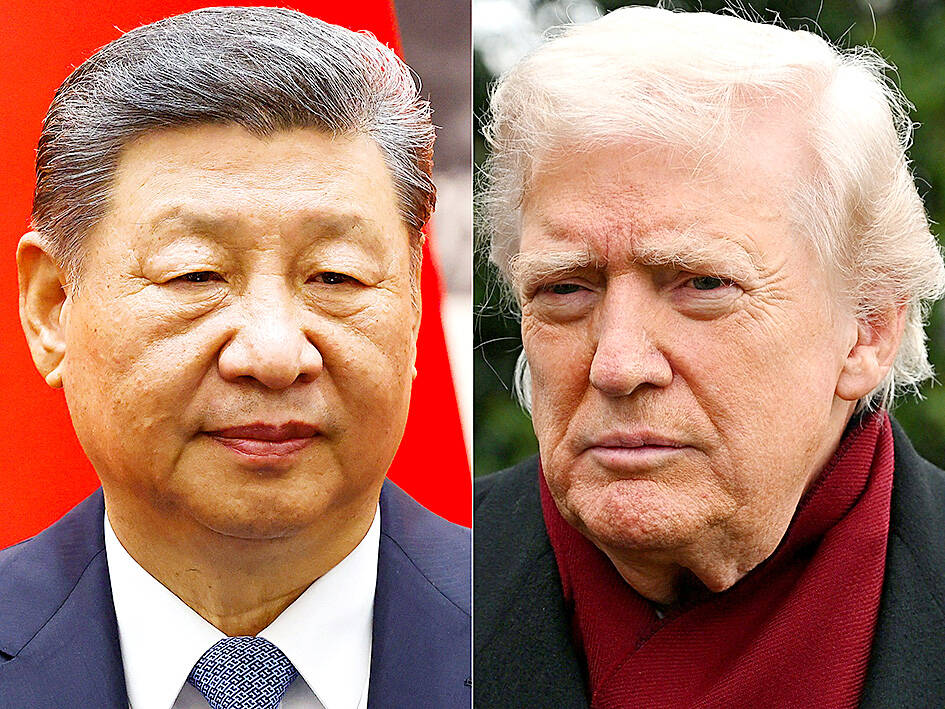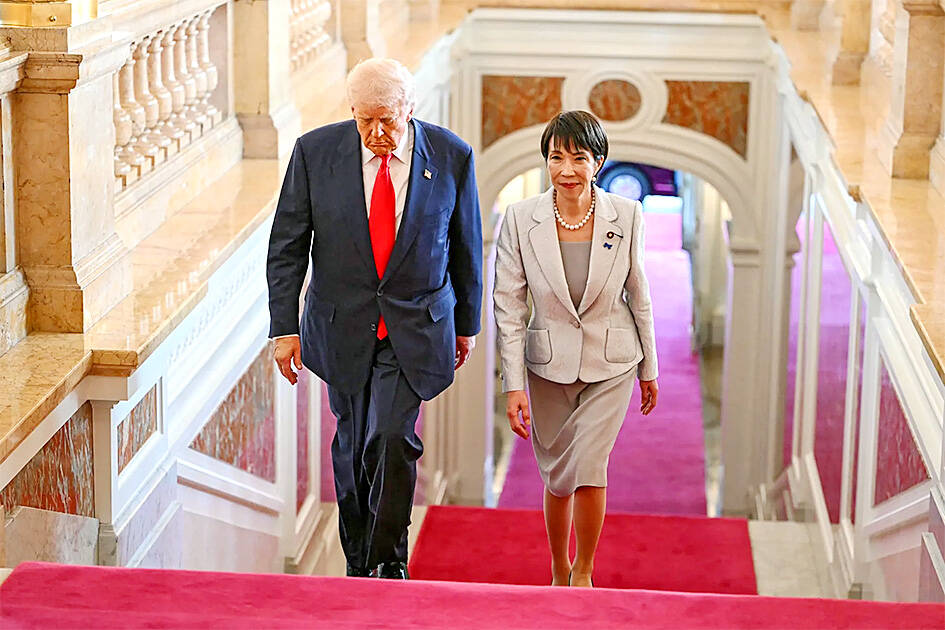US President Donald Trump on Monday held back-to-back telephone calls with the leaders of China and Japan, signaling his desire to balance ties with Asia’s top economies as tensions rise over a Taiwan feud.
Trump’s hour-long conversation with Chinese President Xi Jinping (習近平) marked their first direct contact since reaching a trade truce in South Korea, after both men skipped the weekend’s G20 summit.
Xi pressed his US counterpart on the issue of Taiwan, which did not arise in last month’s encounter, Chinese state media reported.

Photo: AFP
Xi framed his view of Taiwan’s status in stark historical terms, telling Trump the nation’s “return” to China represented an essential element of the post-World War II international order.
The Chinese leader invoked their countries’ wartime alliance against fascism, urging joint efforts to “safeguard the victory of WWII.”
Hours after that conversation, Trump spoke with Japanese Prime Minister Sanae Takaichi, who said the US leader reached out to reaffirm ties with Tokyo and update her on the situation with China, adding that she could call him any time.

Photo: AFP
Trump’s decision to speak with both leaders underscores his determination to avoid getting sucked into a spat between a key US ally and his nation’s top supplier of rare earths.
China has been pressuring nations to pick sides, writing a letter to the UN accusing Japan of contravening international law by suggesting its armed forces could be drawn into a conflict over Taiwan.
The flurry of diplomacy comes as the US’ and China’s trade teams hash out the final details of their truce.
US Secretary of the Treasury Scott Bessent earlier this month said that a rare earths deal between the nations would “hopefully” be completed by tomorrow, although talks on key implementation details continue.
Trump characterized the call with Xi as “very good,” and said they spoke about purchases of soybeans and other agricultural products, as well as curbing shipments of illegal fentanyl.
The US president said he agreed to visit Beijing in April, and had invited Xi for a state visit to the US next year.
Beijing deliberately avoided raising Taiwan in South Korea to focus on trade and steadying ties, said Rorry Daniels, managing director at the Asia Society Policy Institute.
Takaichi’s subsequent comments about potential military intervention in a Taiwan crisis “have now prompted the full court press,” Daniels said.
“China often wants Washington to handle its friction with US allies,” Daniels said, adding that Beijing views allies as “subordinate to US direction.”
Any flare-up between the US and China could imperil a trade truce that saw Washington lower fentanyl-related tariffs on Chinese goods and Beijing agree to suspend certain restrictions on the export of rare earths.
Trump’s public statement on the Monday call with Xi sidestepped Taiwan, focusing on agricultural purchases and fentanyl cooperation.
Trump acknowledged China’s World War II contributions during the call and said the US “understands how important the Taiwan question is to China,” a Chinese readout said.
Trump’s conversation with Xi also touched on Ukraine, with China’s leader expressing support for peace efforts, and hoping parties would reach a “fair, lasting and binding” agreement.
White House press secretary Karoline Leavitt characterized the discussion as focused primarily on trade relations moving “in a positive direction.”

The US government has signed defense cooperation agreements with Japan and the Philippines to boost the deterrence capabilities of countries in the first island chain, a report by the National Security Bureau (NSB) showed. The main countries on the first island chain include the two nations and Taiwan. The bureau is to present the report at a meeting of the legislature’s Foreign Affairs and National Defense Committee tomorrow. The US military has deployed Typhon missile systems to Japan’s Yamaguchi Prefecture and Zambales province in the Philippines during their joint military exercises. It has also installed NMESIS anti-ship systems in Japan’s Okinawa

TRAGEDY STRIKES TAIPEI: The suspect died after falling off a building after he threw smoke grenades into Taipei Main Station and went on a killing spree in Zhongshan A 27-year-old suspect allegedly threw smoke grenades in Taipei Main Station and then proceeded to Zhongshan MRT Station in a random killing spree that resulted in the death of the suspect and two other civilians, and seven injured, including one in critical condition, as of press time last night. The suspect, identified as a man surnamed Chang Wen (張文), allegedly began the attack at Taipei Main Station, the Taipei Fire Department said, adding that it received a report at 5:24pm that smoke grenades had been thrown in the station. One man in his 50s was rushed to hospital after a cardiac arrest

‘WIN-WIN’: The Philippines, and central and eastern European countries are important potential drone cooperation partners, Minister of Foreign Affairs Lin Chia-lung said Minister of Foreign Affairs Lin Chia-lung (林佳龍) in an interview published yesterday confirmed that there are joint ventures between Taiwan and Poland in the drone industry. Lin made the remark in an exclusive interview with the Chinese-language Liberty Times (the Taipei Times’ sister paper). The government-backed Taiwan Excellence Drone International Business Opportunities Alliance and the Polish Chamber of Unmanned Systems on Wednesday last week signed a memorandum of understanding in Poland to develop a “non-China” supply chain for drones and work together on key technologies. Asked if Taiwan prioritized Poland among central and eastern European countries in drone collaboration, Lin

ON ALERT: Taiwan’s partners would issue warnings if China attempted to use Interpol to target Taiwanese, and the global body has mechanisms to prevent it, an official said China has stationed two to four people specializing in Taiwan affairs at its embassies in several democratic countries to monitor and harass Taiwanese, actions that the host nations would not tolerate, National Security Bureau (NSB) Director-General Tsai Ming-yen (蔡明彥) said yesterday. Tsai made the comments at a meeting of the legislature’s Foreign Affairs and National Defense Committee, which asked him and Minister of National Defense Wellington Koo (顧立雄) to report on potential conflicts in the Taiwan Strait and military preparedness. Democratic Progressive Party (DPP) Legislator Michelle Lin (林楚茵) expressed concern that Beijing has posted personnel from China’s Taiwan Affairs Office to its